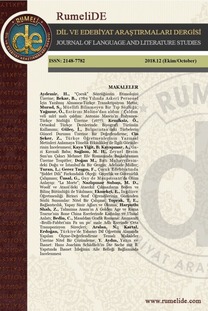Inquiry into the (Con)textual and cultural gist of Orhan Pamuk translations in English
Inquiry into the (Con)textual and cultural gist of Orhan Pamuk translations in English
___
- Aksoy, Nazan & Aksoy, Bülent. (2018). In N. &. Esen, Orhan Pamuk'un Edebi Dünyası Makaleler (pp. 259-271). İstanbul: Yapı Kredi Yayınları.
- Akyıldız, O. (2018). "İki Dünya Arasında Kararsız": Orhan Pamuk'un Kitaplarında "Doğu-Batı" / "Ben-Öteki" Muğlaklığı. In N. &. Esen, Orhan Pamuk'un Edebi Dünyası Makaleler (pp. 205-216). İstanbul: Yapı Kredi Yayınları.
- BirGün. (2020, Temmuz 24). Pamuka "bir şeyler' oldu: Muhalefet, Büyük atatürk'üm laiklik geleneğine sahip çıkm aktan korkuyor. İstanbul, Şişli, Türkiye.
- Elwell, W. F. (2005). Immauel Wallerstein Wallerstein's World-Systems Theory . Retrieved from Sociocultural Systems: http://www.faculty.rsu.edu/users/f/felwell/www/Theorists/Essays/Wallerstein1.htm
- Horta, L. P. (2017, June 17). Ghosts and doubles: Pamuk's editors and translators. Middle Eastern Literatures, pp. 105-124.
- Kutlay, M., & Öniş, Z. (2021). Turkish foreign policy in post-western ordere: strategic autonomy or new forms of dependence? International Affairs, pp. 1085-1104.
- Mattar, K. (2014). Orhan Pamuk and the Limits of Translation: Foreignizing the Black Book for World Literature. Translation and Literature, pp. 42-67.
- Neumann, L. (2022). Toplumsal Araştırma Yöntemleri Nicel ve Nitel Yaklaşımlar. Ankara: Siyasal Kitabevi.
- Pamuk, O. (1998). The New Life. New York: Vintage International.
- Pamuk, O. (2006). Istanbul Memories and the City. London: Faber & Faber.
- Pamuk, O. (2020, July 27). Pamuk: Ayasofya'nın müze olması laiklik mesajıydı. (J. Hahn, Interviewer) Bonn, Bonn, Germany. Retrieved June 18, 2023
- Pamuk, O. (2020). Yeni Hayat. İstanbul: Yapı Kredi Yayınları.
- Pamuk, O. (2021). Resimli İstanbul Hatıralar ve Şehir. İstanbul: Yapı Kredi Yayınları.
- Sözen, O. B. (2021). Re-Interpretation of Turkish Nationalism from Systems Perspective with Post-Modern Emphasis. In Y. E. Tansü, Ahî Evran Anısın Türkiye ve Türk Dünyası Araştırmaları-XII (pp. 343-374). Ankara: İKSAD Publishing House.
- Terlouw, K. (2002). The Semiperipheral Space in the World-System. Review (Fernard Braudel Center), pp. 1-22.
- ISSN: 2148-7782
- Yayın Aralığı: 6
- Başlangıç: 2014
- Yayıncı: Yakup YILMAZ
Güncel iş ilanlarında çevirmen profili
“Kanon” Dışı Bir “Öteki” Olarak Peyami Safa’nın Değerlerine ve Türkçeye Sahip Çıkışı
Awakening a Nation: A Rhetorical Analysis of Derek Walcott’s “The Sea Is History”
Yabancı/ikinci dil öğretiminde farklı yaş gruplarının pedagojisi
Çeviri iş akışında makine çevirisi sistemleri ve sohbet robotlarının bütünleşik kullanımı
Sevda PEKCOŞKUN GÜNER, Edip Serdar GÜNER
Branislav Nuşiç’in “Ramazan Geceleri”nde sosyal hayatın izleri
